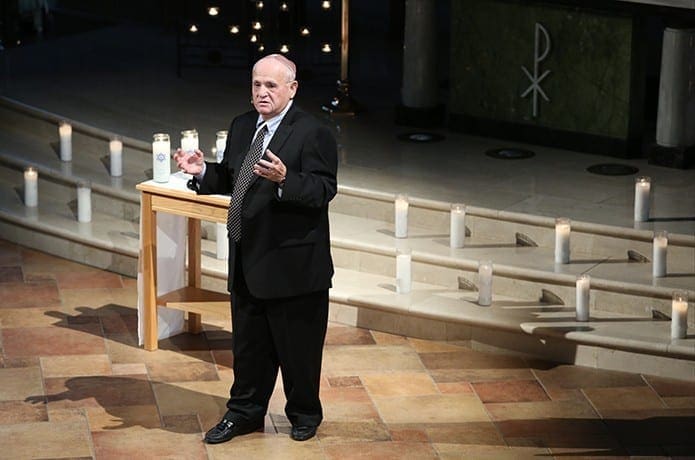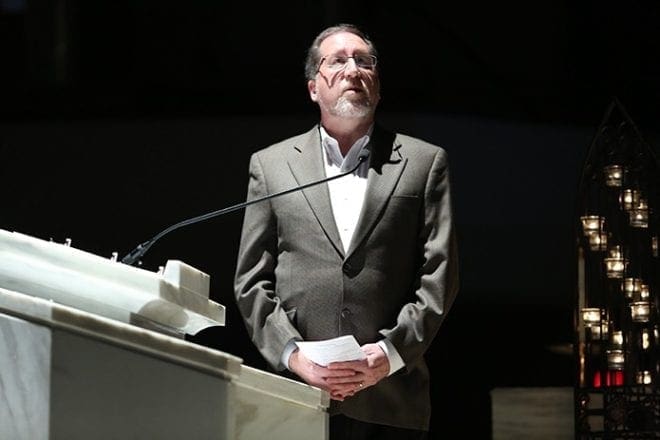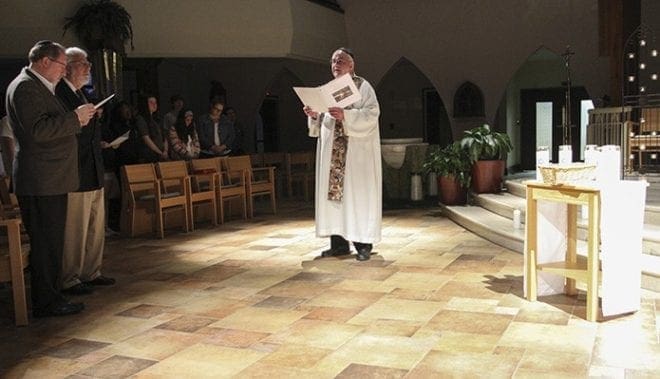 Photo By Michael Alexander
Photo By Michael AlexanderMarietta
Marietta parish, synagogue come together for Holocaust remembrance service
By ANDREW NELSON, Staff Writer | Published April 30, 2015
MARIETTA—In the beginning, the church sanctuary was in darkness. Small flames passed from one candle to another until finally six large shiva candles were lit, a Jewish symbol of mourning.
The congregation heard the challenging poem by Lutheran pastor and theologian Friedrich Martin Niemöller. “First they came for the socialists, and I did not speak out/Because I was not a socialist,” began the poem, as flashlights illuminated the faces of the teenaged readers.
With readings, song and blessings, a crowd filled the Church of St. Ann as the Catholic community hosted the congregation of Etz Chaim Synagogue April 15 for a vigil service for Yom Hashoah, the Holocaust and Heroism Remembrance Day.
There was “a lot of love, a lot of good emotion was felt though the sorrow,” said Amir Oren, 41, an analyst, and member of Etz Chaim Synagogue. Oren attended with his wife and two children. “A lot of people were rubbing tears in their eyes.”
‘A remarkable shift in our relationship’
Holocaust Remembrance Day, an observance in the Jewish community, is held every April 16. This joint commemoration took place as some Catholic and Jewish communities in Atlanta have twinned and are being encouraged by their faiths to build closer ties.
The ongoing dialogue between the Marietta church and synagogue can be traced to “Nostra Aetate,” which promoted better relations between the Catholic Church and non-Christian religions.

Etz Chaim Synagogue associate Rabbi Paul Kerbel, speaking in Hebrew, leads the Mourner’s Kaddish, the traditional mourner’s prayer, as images bearing the names of 17 different concentration camps appear on a screen overhead. Photo By Michael Alexander
This year the Atlanta Archdiocese is marking the 50-year anniversary of the Vatican II document, which reset the relationship between the two faiths. The document’s title is from Latin, “In Our Time” and it affirmed respect for other world religions and called for Jewish-Catholic dialogue for the first time in history.
The document “decries hatred, persecutions, displays of anti-Semitism, directed against Jews at any time and by anyone.”
Rabbi Shalom Lewis of Etz Chaim Synagogue said the document created a “remarkable shift in our relationship” that has “created unimagined harmony between our communities.”
Where once it was considered a sin for a Catholic to enter a Protestant church or a synagogue, today church leaders engage in dialogue with other spiritual leaders to explore differences and commonalities.
Father John Gabriel, a La Salette priest and associate pastor at St. Ann, recalled how his understanding has softened to see God’s hand in different faiths.
“I used to think in terms of black and white when comparing my own faith tradition and everyone else’s. Now I can see that each and every faith tradition is a beautiful, colorful facet in the precious diamond of God’s creation,” he said.
The two faith communities share Roswell Road, about three miles separating their campuses. The collaboration grew out of the liberation of Holocaust prisoners. The father of a La Salette parish priest was a GI who helped to free the concentration camps. The Jewish congregation in the past invited Father Ray Cadran to speak at a memorial.
The ties binding the two communities have grown tighter since. A tree to represent hope was planted in the parish prayer garden and annually in the spring hundreds of daffodils bloom here to recall the children killed during the genocide. Adults have studied together to understand common roots, as well as historical differences.
It is a “rough world,” said Rabbi Lewis, but Catholics and Jews are “natural allies.”
“Joining together teaches respect and puts America’s unique greatness on display,” he said in an email.
‘I want everyone to remember’
Seventy-five years ago two Polish resistance fighters fell in love. On this night in 2015, their son, Hershel Greenblat, told his story to the people at the Church of St. Ann about surviving the extermination of European Jews.

Joined by a standing congregation, Church of St. Ann associate pastor and La Salette Father John “Gabe” Gabriel leads the Mourner’s Kaddish in English. Photo By Michael Alexander
The audience got on their feet to give the 74-year-old a standing ovation before he uttered a word as he traced his family’s story from the Jewish ghettos of Poland and his birthplace in a network of caves called “Priest’s grotto” in western Ukraine to a photo of college-age grandchildren smiling on a couch.
“That’s what happened to my family,” he said, telling about scores of uncles and cousins and grandparents who were killed by the Nazis.
Until he was about 5, the Greenblat family lived in peril, from the war and the Russian army. Life changed when the family made its way to Austria to a displaced persons camp. Greenblat couldn’t praise the American soldiers enough. “None of them were trying to kill us. They did everything they could to make things normal for us. We ran around. We were 6, 7 years old. We had fun.”
The family five years later boarded a ship to the United States. His first view of the nation was on Thanksgiving Day floating past the Statue of Liberty, “a most beautiful sight,” he said.
The family settled in Atlanta in the neighborhood where Turner Field is now. His father opened a convenience store and befriended Martin Luther King Jr. The family grew to four children. Now his family includes professionals, teachers, medical ethicists and more, he said.
Through the “tenacity” of his parents, Greenblat said he and his family have thrived.
“I want everyone to remember (the Holocaust) so it never happens again,” he said.
During the service, Rabbi Lewis recalled traveling with some of his congregation to Eastern Europe, including seeing the notorious Auschwitz camp. He talked about a Torah that is “housed proudly and sadly in our congregation,” which was used by Jewish prisoners in the concentration camp. On the trip, Rabbi Lewis unrolled the Torah as the group gathered around to read Scripture and recite Hebrew blessings “as a group defiant, a group who were alive, and a group who were free.”